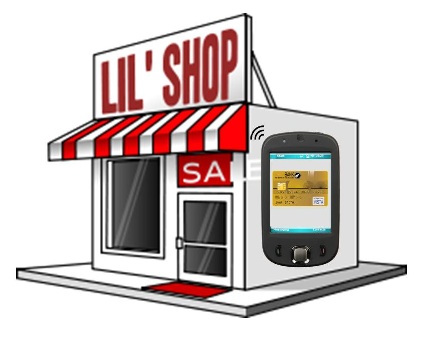Small merchants have yet to show enthusiasm for mobile payments
Mobile commerce is having difficulty gaining traction among small businesses in the United States. According to the U.S. Census Bureau, these companies account for more than 90% of the businesses in the country, but they have yet to show significant support for mobile payments. Large retailers and banks, however, have become quite enthusiastic about mobile commerce, offering consumers services that allow them to manage their money and shop directly from the smartphones and tablets.
NFC technology proves somewhat unattractive for small businesses
One of the reasons that small businesses may not be supporting mobile payments is because NFC technology comprises much of the mobile commerce infrastructure. NFC technology allows digital information to be transmitted over short distances and it has become a powerful tool for the mobile payments space. Most prominent payment services, such as Apple Pay, make use of this technology in order to facilitate transactions, but this requires that physical merchants have an NFC-enabled terminal that is able to interact with this technology.
EMV standards may drive the adoption of mobile commerce among retailers
 For small businesses, adoption of NFC technology may be too costly, which has stunted the growth of mobile commerce among some merchants. An alternative, however, is new Europay, MasterCard, and Visa (EMV) standards, which retailers are required to embrace by October 1. These standards allow all retailers to adopt new payment terminals that support EMV cards. This will allow retailers to also embrace mobile payments, because EMV-enabled cards will be associated with the payment services being used by consumers.
For small businesses, adoption of NFC technology may be too costly, which has stunted the growth of mobile commerce among some merchants. An alternative, however, is new Europay, MasterCard, and Visa (EMV) standards, which retailers are required to embrace by October 1. These standards allow all retailers to adopt new payment terminals that support EMV cards. This will allow retailers to also embrace mobile payments, because EMV-enabled cards will be associated with the payment services being used by consumers.
Small retailers have little interest in EMV standards
While small retailers will also have to adopt EMV-enabled terminals, many have yet to outline plans to do so, partly due to high costs. If retailers do not embrace the new EMV standards, they will be held liable for any fraudulent purchases that are made through their establishments. Once small retailers begin feeling the consequences of these fraudulent purchases, however, they are likely to adopt the standards and begin acquiring EMV-enabled terminals.
The mobile space is growing as retailers change how they engage consumers
The holiday season may be a major opportunity for companies involved in mobile commerce, especially social media companies that are working with retailers. A recent report from eMarketer predicts that retail sales in the United States will grow year-over-year by 5.6% this year. Mobile commerce is expected to play a significant role in this growth, with mobile sales growing 32% year-over-year by the end of 2015. Many consumers are expected to use their mobile devices to get their holiday shopping done this year.
Better smartphones are improving the mobile shopping experience
According to the report, an estimated 25% of all e-commerce transactions are expected to be made through a smartphone in the United States. Consumers are beginning to rely more heavily on these devices, as they represent a more convenient way to shop. Advances in smartphone technology and design have further increased their attractiveness to mobile shoppers. Larger screens have made it easier for consumers to browse digital stores and purchase products. An enjoyable mobile shopping experience makes it more likely that consumers will continue to participate in mobile commerce.
Social commerce is growing quickly
 As mobile shopping continues to experience healthy growth, social networks are beginning to play a larger role in the mobile space. These companies have been involved in the mobile world for several years, but have only just begun to participate in mobile commerce. Companies like Facebook, Twitter, and Instagram are indulging in a new concept called social commerce, which involves selling products online through social networking sites. Social commerce is becoming a strong tool for retailers, especially those that want to engage mobile consumers. Many consumers favor using their mobile devices to visit social media sites, which has created new opportunities for retailers.
As mobile shopping continues to experience healthy growth, social networks are beginning to play a larger role in the mobile space. These companies have been involved in the mobile world for several years, but have only just begun to participate in mobile commerce. Companies like Facebook, Twitter, and Instagram are indulging in a new concept called social commerce, which involves selling products online through social networking sites. Social commerce is becoming a strong tool for retailers, especially those that want to engage mobile consumers. Many consumers favor using their mobile devices to visit social media sites, which has created new opportunities for retailers.
Consumers see mobile commerce as more convenient than visiting physical stores
Mobile commerce is expected to see significant growth over the holiday season. As in previous years, consumers are expected to use their mobile devices to get their shopping done and avoid large crowds at physical retail stores. The convenient nature of mobile commerce has proven to be quite attractive to consumers and more retailers are focusing more heavily on the mobile space.
 For small businesses, adoption of NFC technology may be too costly, which has stunted the growth of mobile commerce among some merchants. An alternative, however, is new Europay, MasterCard, and Visa (EMV) standards, which retailers are required to embrace by October 1. These standards allow all retailers to adopt new payment terminals that support EMV cards. This will allow retailers to also embrace mobile payments, because EMV-enabled cards will be associated with the payment services being used by consumers.
For small businesses, adoption of NFC technology may be too costly, which has stunted the growth of mobile commerce among some merchants. An alternative, however, is new Europay, MasterCard, and Visa (EMV) standards, which retailers are required to embrace by October 1. These standards allow all retailers to adopt new payment terminals that support EMV cards. This will allow retailers to also embrace mobile payments, because EMV-enabled cards will be associated with the payment services being used by consumers.
 As mobile shopping continues to experience healthy growth, social networks are beginning to play a larger role in the mobile space. These companies have been involved in the mobile world for several years, but have only just begun to participate in mobile commerce. Companies like Facebook, Twitter, and Instagram are indulging in a new concept called social commerce, which involves selling products online through social networking sites. Social commerce is becoming a strong tool for retailers, especially those that want to engage mobile consumers. Many consumers favor using their mobile devices to visit social media sites, which has created new opportunities for retailers.
As mobile shopping continues to experience healthy growth, social networks are beginning to play a larger role in the mobile space. These companies have been involved in the mobile world for several years, but have only just begun to participate in mobile commerce. Companies like Facebook, Twitter, and Instagram are indulging in a new concept called social commerce, which involves selling products online through social networking sites. Social commerce is becoming a strong tool for retailers, especially those that want to engage mobile consumers. Many consumers favor using their mobile devices to visit social media sites, which has created new opportunities for retailers.